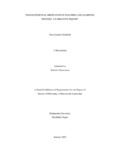
Please use this identifier to cite or link to this item:
https://hdl.handle.net/20.500.14301/539| Title: | Transcendental Meditation in Teaching and Learning Process: A Narrative Inquiry.{unpublished MPhil Disertation] |
| Authors: | Gorathoki, Uma Kumari |
| Citation: | Gorathoki , U.K.(2025).Transcendental meditation in teaching and learning process: A narrative inquiry. |
| Issue Date: | Jan-2025 |
| Publisher: | Kathmandu University School of Education |
| School: | SOED |
| Department: | DOEL |
| Level: | M.Phil. |
| Program: | MPhil in Educational Leadership |
| Abstract: | Transcendental meditation has been implemented in different schools in Nepal since 2013. However, no research has been conducted yet. This study was conducted to explore teachers' experiences after practicing Transcendental Meditation (TM) and how they have influenced teaching and learning in the school. I purposively selected four participants from three different schools practicing TM for more than five years. I collected information through in-depth interviews along with observational guidelines. I used narrative inquiry as my research design to explore their stories through an interpretive paradigm. I followed Mezirow’s transformative learning theory, which helped me to connect adult learning (teacher’s learning) with critical thinking, self-reflection, analysis, transformation in the habits of mind, and disorienting the dilemmas along with TM practice. I also used Maslow’s Hierarchical Needs Theory to construct meaning. From this research, I discovered that regular practice of transcendental meditation helps students and teachers purify thoughts and behavior and makes people mentally and socially healthy. The finding in the educational activities is the inclusion of Consciousness-Based Education (CBE), which follows sixteen principles of the Science of Creative Intelligence (SCI) in the classroom by meditation practitioners. Adult learners do not easily accept anything new because of the dilemmas and preoccupied mindset suggested by Mezirow in Transformative Learning Theory. However, regular practice of Transcendental Meditation (TM) is found to be effective in transforming teachers' habits of mind. They have tried to bring some changes in teaching by connecting the holistic approach of SCI’s sixteen principles, where they initiate students to imagine the concept through a broad lens and express it in any form such as drawing, poem, essay, story, or chart relating the topic to their life to understand more easily. As a result, this research will assist all schoolteachers and students who wish to transform their personal and professional lives.TM, if not guided properly or if the new participants do not share their problems with the TM instructor in the follow-up programs, may also create stress for them. The knowledge explored in this research will also provide feedback to those connected to transcendental meditation and implementing it in their schools. It will also help other researchers with a keen interest to contribute more concerning a similar topic. |
| URI: | https://hdl.handle.net/20.500.14301/539 |
| Appears in Collections: | Dissertation |
Files in This Item:
| File | Description | Size | Format | |
|---|---|---|---|---|
| Uma Gorathoki, Final Dissertation.pdf | 2.91 MB | Adobe PDF |  View/Open |
Items in DSpace are protected by copyright, with all rights reserved, unless otherwise indicated.